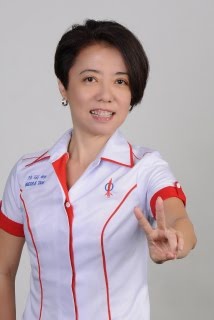One of my favourite articles. I actually wrote this in 2005 ! (http://www.malaysianbar.org.my/index2.php?option=com_content&do_pdf=1&id=1805) (http://www.malaysiakini.com/letters/40261)
Thoughts from the Past, Part 2 - All Are True Fighters
I read with great interest Joceline Tan's analysis "The true fighters for Merdeka" (Sept 7, 2005) (http://thestar.com.my/news/story.asp?file=/2005/9/7/nation/11967750&sec=nation). I also read Ronnie Liu's "The real fighters for MERDEKA" (Sept 3, 2005) (http://dapmalaysia.org/all-archive/English/2005/Sept05/Bul/bul2803.htm). The latter has provoked UMNO Youth to challenge DAP to repeat that statement in the Parliament. Who’s wrong or who’s right? Let me juxtapose four individuals who “fought” for independence, against each other and let you decide.
Mahatma Gandhi "fought" for the independence of India from British colonial rule, empowered by tens of millions of common Indians. Throughout the struggle of the Indian campaign for home rule, he opposed any form of terrorism or violence. He used the highest moral standards. By means of non-violent civil disobedience or demonstrations, Gandhi helped bring about India's independence from British rule, inspiring other colonial peoples to work for their own independence and ultimately dismantling the British Empire.
Lee Kuan Yew having observed the Communists to be very totally dedicated and devoted to their cause, collaborated with the Communists like Fang Chuang Pi ("the Plen"), Lim Chin Siong and Fong Swee Suan. Anti-colonialism was their common cause. While he preferred to play within the existing legal framework by using pragmatism to achieve Singapore's independence, the communists wanted to replace the existing system with communist rule, which inevitably mean bloodshed. Nonetheless, he played along with pro-Communists' popularity. Once in power, Lee Kuan Yew sought to dilute the influence of the Communists in a bigger population by merging with Malaya and at the same time achieve independence from the British. Lee Kuan Yew later admitted that it was the communists who supported him in becoming the Prime Minister in 1959, in his memoirs. He defined the official position of the PAP as being "non-communist" rather than "anti-communist".
During the constitutional struggle for independence, Tunku Abdul Rahman did not adopt a manifesto denouncing colonialism. We cannot deny the fact that Tunku was indeed a very senior civil servant of the British government. He was part of the system. I guess the adage “if you can’t beat them, join them” comes to mind. The difference is however, Tunku did not just to join them but he chose to “fight” them within the system. Tunku used negotiations and consultation in order to “fight” for independence. The Alliance, a coalition of UMNO; MCA and MIC, was formed as a formula for a stable self-government. Of course, the pressure mounted by the Communist Party of Malaya and the Baling talks added weight to the “fight”.
Chin Peng “fought” the Japanese and British. He waged war against the enemies and invaders. He chose the harder road of guerrilla warfare because of he had gone through the ghastly period of the corrupt British Military Administration in Malayan towns and villages and seen the sufferings and poverty due the Japanese atrocities. In fact, Maharaja Lela killed JWW Birch in Pasir Salak and he is now a hero. CPM killed Sir Henry Gurney and they are now terrorists. Armed struggle all over the world is rooted in a deeper cause, provoked by discontentment arising from the breakdown of the socio-economic and political system they are in. The Government has acknowledged that the CPM did play a part in hastening the independence of Malaysia. Tan Sri Rahim Noor affirmed this fact at the signing of the Haadyai Peace Accord of 1989 at the Lee Garden Hotel. Communism failed in Malaysia because of the Briggs Plan; in-fighting; and most importantly, there was no close and strong ally, like what Vietnam had in China.
This is definitely a blessing in disguise. Joceline is astute in her observations that had the Communists succeeded, the country would have been a little communist state with Cultural Revolution and Great Leap Forward to boot. One interesting point I would like to highlight is that the Communist Party of Malaya was actually started in a little rubber estate in Kuala Pilah back in 30-4-1930 presided over by Ho Chih-Min ! I would gather that Kuala Pilah might have more significance if the country swayed to the left, hypothetically speaking of course. In fact, if the country had been left to its own devices, it may very well ended up like Vietnam and the rest of the Indochina countries.
The smoke screen here is that both parties’ (DAP and UMNO Youth) contention on the correctness of their argument. To me it is crystal clear, they were all the true fighters against the colonial masters. Fighting can be in many ways. Whereas some individuals and parties resorted to violence and guerrilla warfare, Gandhi resorted to non-violence civil disobedience; Lee Kuan Yew resorted to a collaboration with the communists (i.e., a pseudo-communist means) for a democratic end; and Tunku Abdul Rahman resorted to democratic means, preceded and hastened by the “fight” by Dato’ Bahaman, Mat Kilau, Mat Kelubi, Maharaja Lela, Chin Peng & CPM, PKMM and API (although there was no collaboration) for a democratic end. The real test is not whether the “fighters” were jailed, killed or maimed but whether they succeeded in achieving their goal. To me, they were all true fighters as they contributed one way or another to the achieve their common goal : INDEPENDENCE.
As Gandhi said: "I have nothing new to teach the world. Truth and non-violence are as old as the hills."














